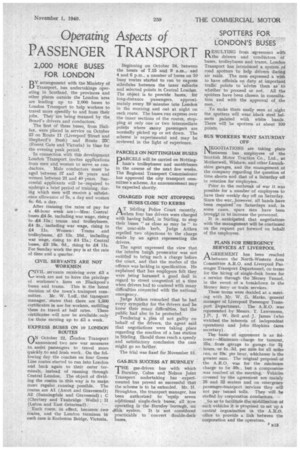SPOTTERS FOR LONDON'S BUSES
Page 31

If you've noticed an error in this article please click here to report it so we can fix it.
RESULTING from agreement with the drivers and conductors Of buses, trolleybuses and trams, London Transport has introduced a system rit road spotters to help drivers during air raids. The men expressed a wish to have officials on duty at important traffic points to 'advise them as' to whether to proceed or not. All the spotters have been chosen in consultation and with the approval of the men.
To make them easily seen at night the spotters will wear black steel helmets painted with white bands. There will be spotters at about 100 points.
BUS WORKERS WANT SATURDAY
MEGOTIATIONS are taking place Nbetween bus employees of the Scottish Motor Traction Co., Ltd., at Motherwell, Wishaw, and other Lanarkshire garages, and the management of the company regarding the question of time sheets and that of a Saturday off in rotation for employees.
Prior to the outbreak of war it was possible for a number of employees to have their weekly day off on Saturday. Since the war, however, all hands have been required on Saturdays and, in some cases, spare men have been brouglst in to increase the personnel.
It is anticipated that negotiations with the management will be continued on the request put forward on behalf of the employees.
PLANS FOR EMERGENCY SERVICES AT LIVERPOOL
A GREEMENT has been reached tA between the North-Western Area Committee A.R.O. and Liverpool Passenger Transport Department, on terms for the hiring of single-deck buses for a service through the Mersey Tunnel, in the event of a breakdown in the Mersey ferry or train services.
These terms were decided at a meeting with Mr. W. .G. Marks, -general manager cif Liverpool Passenger Transport Department. The A.R.O. was represented by Messrs. T. Lawrenson, J.P., J. W. Bell and J. James (who watched the interests of independent operators) and John Hopkins (area secretary).
The basis of agreement is as follows :—Minimum charge for turnout, 25s. from tgarage to garage for 2+
• hours, -or 1s.• 3d. per mile for all miles run, or 10s: per hour, whichever is the greater sum. The original propcisalsof the A.R.O. was for the minimum charge to he 30s., but a compromise was reached at the meeting. Vehicles covered by the agreement are mainly 26 and 32 seaters and on emergency passenger-transport services they will not pay tunnel tolls. They will . be staffed by corporation conductors. , So as to facilitate the mobilization of such vehicles it is propcised to set up a central organization in the A.R.O. office to provide a link between the corporation and the operators.




















































